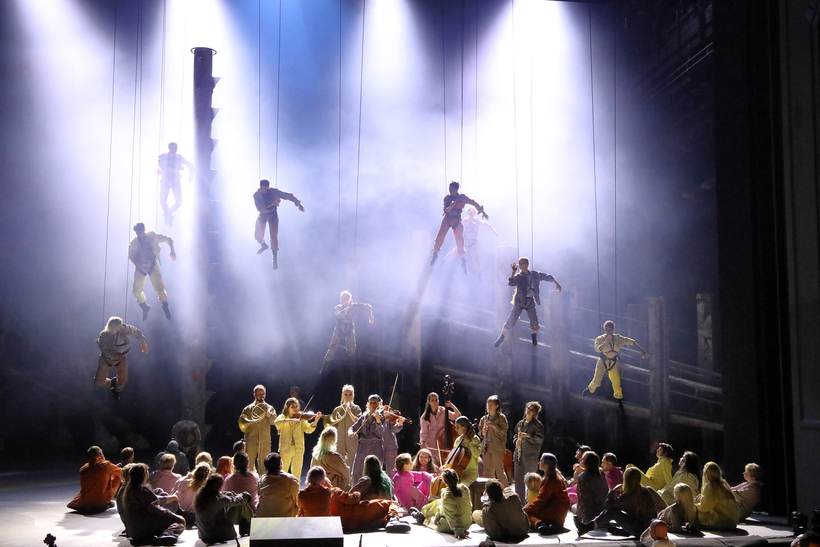Fogeys of all ages may decry to their hearts’ content the routine vandalism of hotshot directors who ride roughshod over operatic texts we hold sacred. A singer with a career to make has no choice but to buy in, trusting voice and animal magnetism to win the day. In the Bayerische Staatsoper’s latest production of the 20-something Mozart’s breakout masterpiece Idomeneo, the Toronto-born mezzo-soprano Emily D’Angelo shows how.
The title role of the opera belongs to the King of Crete, who is just returning home from the Trojan War. D’Angelo appears as his son, Idamante, the straightest of straight arrows—Dullsville, potentially, but for his electric entanglements. For one thing, Idamante is in the crosshairs of two rival princesses. For another, the long-lost father he idolizes has accidentally promised him as a sacrifice to Neptune. When the divine patience runs out, guess who steps up to save the island from an irate sea monster?
The director Antú Romero Nunes has given the opera a ruggedly industrial production on a colossal scale. The action unfolds on and around a crumbling pier, densely peopled with unkempt extras who mostly glower into the auditorium, though for one magic moment, they smile among themselves. That’s when blobs of light materialize at their fingertips, like a magician’s silver dollars plucked from midair. A neat trick!

The conductor Constantin Carydis, who should have put his foot down, allows the flow of the score to go dead for intervals of protracted silence and muffled mutterings. None of this in the least cramps D’Angelo’s style. Long-stemmed and limber, her lush black hair clipped like Peter Pan’s, she’s dressed for action in a mechanic’s overalls and work boots, all set to tackle every obstacle in sight. For an encore, she tumbles through space in slow-mo free fall, dangling from a cable.
But the athletics are extracurricular. Dark eyes aglow with liquid fire, D’Angelo invests Idamante’s reams of music with the same unerring sense of purpose. Hers is a thrilling instrument, clear and lithe in timbre, her expression radiant in devotion, noble in despair.
In addition to the checklist of expected numbers, she has been assigned an extra concert aria, “Ch’io mi scordi di te?,” one of Mozart’s most glorious. A valentine to a beloved soprano, the piece features a rapturous piano solo originally performed by the composer himself. Startling as it is within the sound world of the opera to hear the keyboard spring so tunefully to life, who could object? Certainly no fan of vocal excellence, far less any diva worth her salt.
It’s less welcome, at the end of the evening, to find that the production includes the seldom-heard ballet music, amateurishly danced to an onstage audience of one. That would be the fine American tenor Matthew Polenzani as Idomeneo, deposed from the throne of Crete just seconds before. He cools his heels on a steamer trunk, catatonic with ennui, eventually unwrapping a sandwich. Is that any way to treat an opera star?
The artist who wins the sympathy vote hands down, however, is the German soprano Hanna-Elisabeth Müller as the high-strung Greek princess Elettra. Her role concludes with a volcanic exit aria—but that’s just music. For a more thrilling send-off, Nunes has her empty a bucket of black sludge down her throat. It’s the scariest act of self-slaughter since Portia swallowed fire offstage in Julius Caesar. Mozart lovers, you’ve been warned.
Idomeneo is available to watch on the Bayerische Staatsoper Web site through August 26
Matthew Gurewitsch writes about opera and classical music for AIR MAIL. He lives in Hawaii

